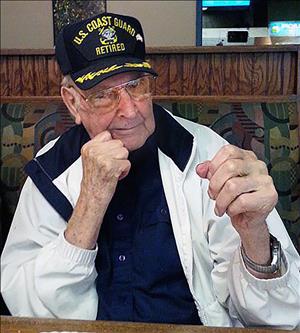Morest L. (Morey) Skaret (b. 1913), a 1932 graduate of West Seattle High School who retired in 1981 after careers with both the Seattle Police Department and the Coast Guard, had several other interesting jobs earlier in his work life. One of his early employers was Waterman Tug and Barge, which operated towboats on Puget Sound. His duties included procuring “alkee” (bootleg alcohol) from a bootlegger on Blake Island, not all of which found its way to his boss. In this account, published in the Winter/Spring 2001 edition of the Fauntleroy Community Association’s quarterly newsletter, Neighbors, Skaret describes his experiences with the bootlegger.
"Alkee" on Blake Island
Shortly before the end of Prohibition in 1933, two down-and-out men I knew who were living on Skid Road each got hold of a rowboat. One rowed to Maury Island to make a fresh start and the other rowed to Blake Island.
The south end of Blake has always been state school land and a small creek runs through the middle of it. Over time, it formed just about the only flat piece of land on that end of the island. The fellow decided to squat there and become a bootlegger.
Now "bootlegger" derives from the practice that men who made whiskey during Prohibition had of hiding a pint inside their boot, then slipping it out when a customer came along. This fellow built a shack out of beach wood and assembled a still to make what people called "alkee" (al-KEE). I'm not sure how it was spelled but that's how it was pronounced.
The little town of Colby sits west of Blake on the Olympic Peninsula and at the time it had a busy sawmill and a store. The bootlegger bought his staples there, as well as apples for his mash. He also used fruit from trees he planted up above the beach. As I recall, he charged $2.50 for a gallon of alkee and most of his customers came to him.
My job was to tow logs and other things up and down the Sound. Whenever one of his towboats was going to the Colby mill, Mr. Waterman would tell the crew to get him a gallon of alkee from the bootlegger on the south end of Blake. My partner, Rudy Arness, and I made that stop several times. The day we were pulling four sections of alder logs north in Colvis Passage was typical.
When we got to Blake, I let Rudy off in the skiff to row ashore to the bootlegger's while I made a wide circle into Yukon Harbor. It was quite a rig to turn around for the sake of getting a gallon of that alkee! In about an hour, I came full circle and there was Rudy with the jug and a big smile on his face because he knew what we were going to do.
When he got onboard, we poured off a quart of that alkee and stashed it where the boss wouldn't see it. Then we topped off the jug with water!
As always, Mr. Waterman was glad to see us when we got back. "Did you get the alkee for me, boys?" he asked. "Did you get the alkee?"
"Oh, yes, sir," we assured him with straight faces.
"I tell you, boys, that's the smoothest alkee I've ever had!" he said.
Mr. Waterman never discovered why. Undiluted alkee was very strong and our purloined quart of it lasted Rudy and me quite awhile.

